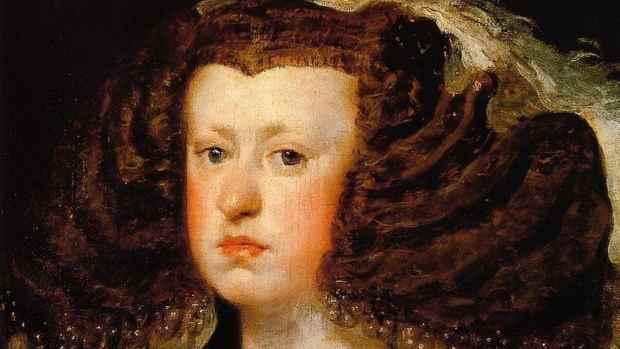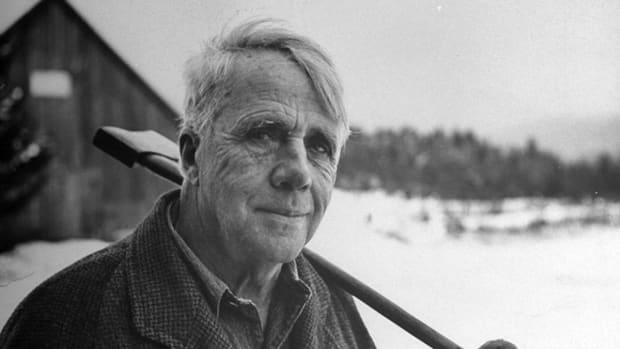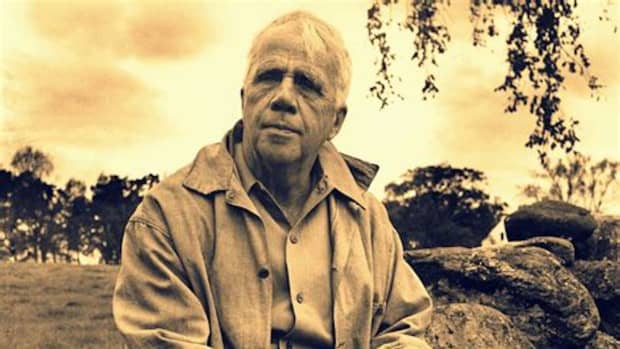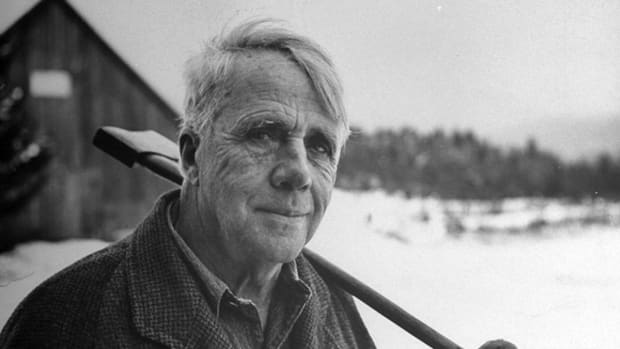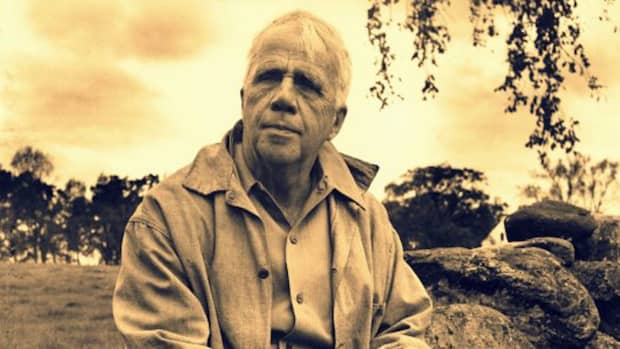Robert Frost's "The Fear"

Robert Frost in 1943 - Library of America - Eric Schaal/The LIFE Picture Collection/Getty Images
Library of America - Eric Schaal/The LIFE Picture Collection/Getty Images
Introduction and Text of "The Fear"
Robert Frost's "The Fear" is a narrative poem from his collection titled North of Boston; the poem consists of 103 lines without a rime-scheme. The poem's atmosphere becomes rather eerie not only because of the darkness late at night and the isolated location of the couple's home but also because of the woman's obsession that she is being stalked by a former lover. She seems to become ever more unhinged as the conversation wears on.
(Please note: Dr. Samuel Johnson introduced the form "rhyme" into English in the 18th century, mistakenly thinking that the term was a Greek derivative of "rythmos." Thus, "rhyme" is an etymological error. For my explanation for using only the original form "rime," please see "Rime vs Rhyme: Dr. Samuel Johnson’s Error.")
The Fear
A lantern light from deeper in the barn
Shone on a man and woman in the door
And threw their lurching shadows on a house
Near by, all dark in every glossy window.
A horse's hoof pawed once the hollow floor,
And the back of the gig they stood beside
Moved in a little. The man grasped a wheel,
The woman spoke out sharply, 'Whoa, stand still!'
'I saw it just as plain as a white plate,'
She said, 'as the light on the dashboard ran
Along the bushes at the roadside-a man's face.
You must have seen it too.'
'I didn't see it.
Are you sure—'
'Yes, I'm sure!'
'-it was a face?'
'Joel, I'll have to look. I can't go in,
I can't, and leave a thing like that unsettled.
Doors locked and curtains drawn will make no difference.
I always have felt strange when we came home
To the dark house after so long an absence,
And the key rattled loudly into place
Seemed to warn someone to be getting out
At one door as we entered at another.
What if I'm right, and someone all the time—
Don't hold my arm!'
'I say it's someone passing.'
'You speak as if this were a travelled road.
You forget where we are. What is beyond
That he'd be going to or coming from
At such an hour of night, and on foot too.
What was he standing still for in the bushes?'
'It's not so very late-it's only dark.
There's more in it than you're inclined to say.
Did he look like—?'
'He looked like anyone.
I'll never rest to-night unless I know.
Give me the lantern.'
'You don't want the lantern.'
She pushed past him and got it for herself.
'You're not to come,' she said. 'This is my business.
If the time's come to face it, I'm the one
To put it the right way. He'd never dare—
Listen! He kicked a stone. Hear that, hear that!
He's coming towards us. Joel, go in-please.
Hark!-I don't hear him now. But please go in.'
'In the first place you can't make me believe it's—'
'It is-or someone else he's sent to watch.
And now's the time to have it out with him
While we know definitely where he is.
Let him get off and he'll be everywhere
Around us, looking out of trees and bushes
Till I sha'n't dare to set a foot outdoors.
And I can't stand it. Joel, let me go!'
'But it's nonsense to think he'd care enough.'
'You mean you couldn't understand his caring.
Oh, but you see he hadn't had enough—
Joel, I won't-I won't-I promise you.
We mustn't say hard things. You mustn't either.'
'I'll be the one, if anybody goes!
But you give him the advantage with this light.
What couldn't he do to us standing here!
And if to see was what he wanted, why
He has seen all there was to see and gone.'
He appeared to forget to keep his hold,
But advanced with her as she crossed the grass.
'What do you want?' she cried to all the dark.
She stretched up tall to overlook the light
That hung in both hands hot against her skirt.
'There's no one; so you're wrong,' he said.
'There is.—
What do you want?' she cried, and then herself
Was startled when an answer really came.
'Nothing.' It came from well along the road.
She reached a hand to Joel for support:
The smell of scorching woollen made her faint.
'What are you doing round this house at night?'
'Nothing.' A pause: there seemed no more to say.
And then the voice again: 'You seem afraid.
I saw by the way you whipped up the horse.
I'll just come forward in the lantern light
And let you see.'
'Yes, do.-Joel, go back!'
She stood her ground against the noisy steps
That came on, but her body rocked a little.
'You see,' the voice said.
'Oh.' She looked and looked.
'You don't see-I've a child here by the hand.'
'What's a child doing at this time of night—?'
'Out walking. Every child should have the memory
Of at least one long-after-bedtime walk.
What, son?'
'Then I should think you'd try to find
Somewhere to walk—'
'The highway as it happens—
We're stopping for the fortnight down at Dean's.'
'But if that's all-Joel-you realize—
You won't think anything. You understand?
You understand that we have to be careful.
This is a very, very lonely place.
Joel!' She spoke as if she couldn't turn.
The swinging lantern lengthened to the ground,
It touched, it struck it, clattered and went out.
Commentary on "The Fear"
This piece is a dramatic, narrative poem featuring a narrator and four characters—a husband, the only named character, a wife, a man, and the man’s son, who does not speak.
First Movement: The Narrator Begins
The poem begins with the narrator’s description: the husband and wife have returned home after being away for several hours. They are in the barn, standing beside their horse and carriage. The wife claims that she saw a man’s face “as plain as a white plate” as they were nearing their farm.
She insists she saw it, but her husband retorts that he did not see it, and he asks her if she is sure of what she saw. He is interrupted by the wife, insisting that she did see it, to which her husband asks if it was a face. The wife is uneasy about going into the house without discovering to whom the face belongs; thus she suggest that they not go into the house without further investigating.
Joel disagrees that someone is snooping around the house and tries to dissuade her going out and trying to find someone by grabbing her arm. She screeches for him to let go of her arm, but he insists that what she saw was probably just someone moving along the road.
Second Movement: Her Complaint of Isolation
The wife then reminds her husband of how isolated their farm is; she insists that if anyone is lurking around, it is for the specific purpose of seeing her. Joel then realizes that his wife thinks the man who may be “standing still [ ] in the bushes,” may be a man she once knew. Joel remarks that it just barely dark and not late in the night. He then seems to begin to approach in issue that the wife seems reluctant to pursue.
Yet again, the wife interrupts her husband by saying that he just looked like “anyone,” but she again insists that she has to go look. After he discourages her again, she takes the lantern and tells him not to follow her because this is her business.
Joel then realizes that he wife thinks this prowler is a man with whom she has had an assignation, and he thinks she is being silly: “In the first place you can’t make me believe it’s—.” Again interrupting him, she says it’s either her former lover or someone he has sent to spy on her.
Third Movement: The Broken Pride
Joel derides the idea that this man would care enough to be out snooping around their farm or sending another person in his stead. To which the indignant wife barks, essentially accusing her husband of not caring enough for her. She then flatters herself further by adding that the other man wanted more of her. But she then tries to temper her suggestion by asserting that they must not "say hard things" to each other.
Joel insists on accompanying his wife to check for the prowler, and as they advance forward into night, she begins to call out. Finally someone answers her question, “What do you want?” with “Nothing.” The man finally comes forward into the lantern light. She sees that it is not the former lover. Accompanying him is his son.
They were simply on their way to “Dean’s” with whom they are to visit for a couple of weeks. The wife is taken aback; she excuses her intrusion on the couple’s journey by saying that the couple has to be caring living in such an isolation "very, very lonely place." She then calls her husband’s name and lets the lantern drop; hitting the ground, its light goes out.
The Dousing of Desire
The simple narration reveals the vanity of a woman who thinks that her former lover is obsessed with her and her disappointment after she realizes she was wrong. At the end, the symbolic dousing of the lantern as it thumps the ground parallels the dousing of the woman’s burning desire to have this former lover taking pains to see her.
Related Robert Frost Information
"Life Sketch of Robert Frost." Owlcation. - Taking his place among luminaries such as Dickinson and Whitman, Frost has remained one of the most widely anthologized American poets of all time. His poems are more complex than simple nature pieces; many are "tricky—very tricky," as he once quipped about "The Road Not Taken."
Other Commentaries on Frost Poems
Robert Frost’s "The Road Not Taken." Owlcation. - Robert Frost's "The Road Not Taken" is often misinterpreted; it does not encourage nonconformity. It dramatizes the difficulty of making choices and then living with the consequences.
Robert Frost's "Stopping by Woods on a Snowy Evening." Owlcation. - Robert Frost's "Stopping by Woods on a Snowy Evening" remains simple, but the repeated phrase, "And miles to go before I sleep," gives room for Interpretation. Many of Frost's poems possess a tricky element, and he quipped about "The Road Not Take" being "very tricky."
Robert Frost's "Bereft." Owlcation. - Robert Frost's poem "Bereft" displays one of the most amazing metaphors to be encountered in poetry: "Leaves got up in a coil and hissed, / Blindly struck at my knee and missed." Like "The Road Not Taken," however, this poem offers up a tricky feature.
Robert Frost’s "God’s Garden." Owlcation. - In Robert Frost’s "God’s Garden," the speaker employs an extended allusion to the Garden of Eden story from the biblical lore of the Judeo-Christian tradition. Through symbolic uses of "gold" and "stars," the speaker demonstrates his thoughts on humankind’s descent into depravity.
This content is accurate and true to the best of the author’s knowledge and is not meant to substitute for formal and individualized advice from a qualified professional.
© 2024 Linda Sue Grimes

